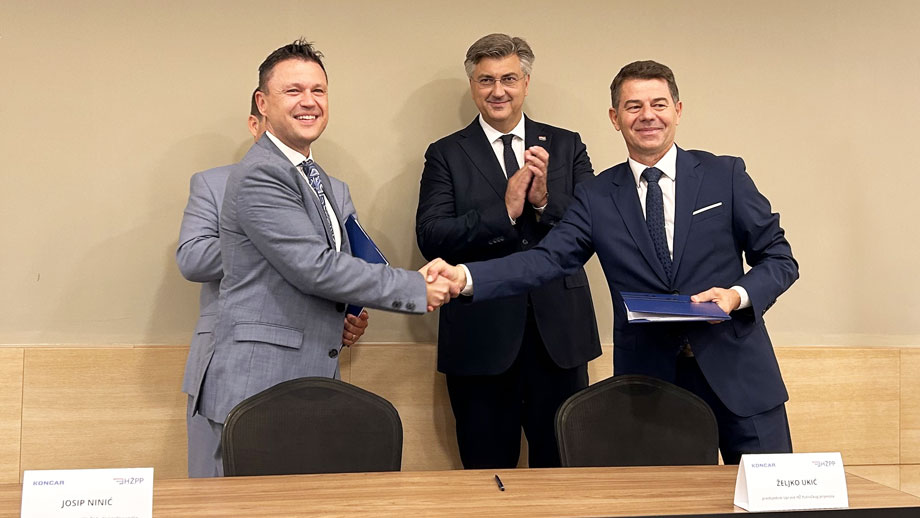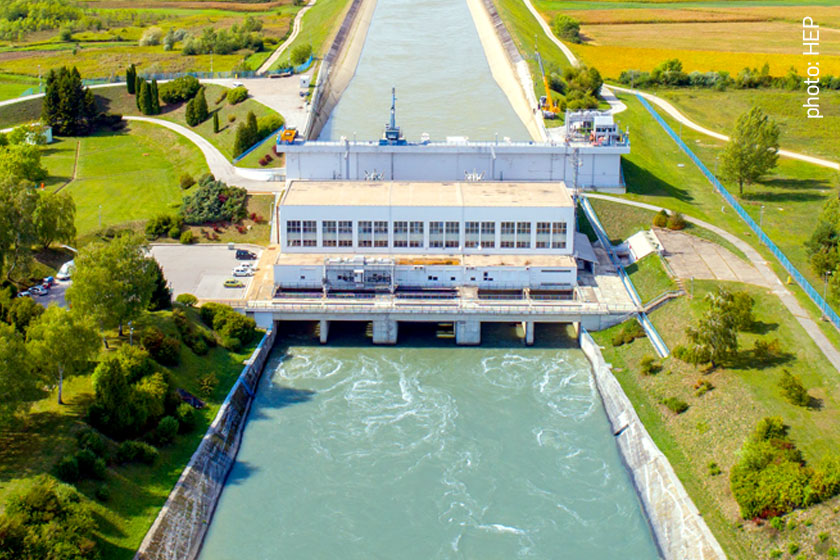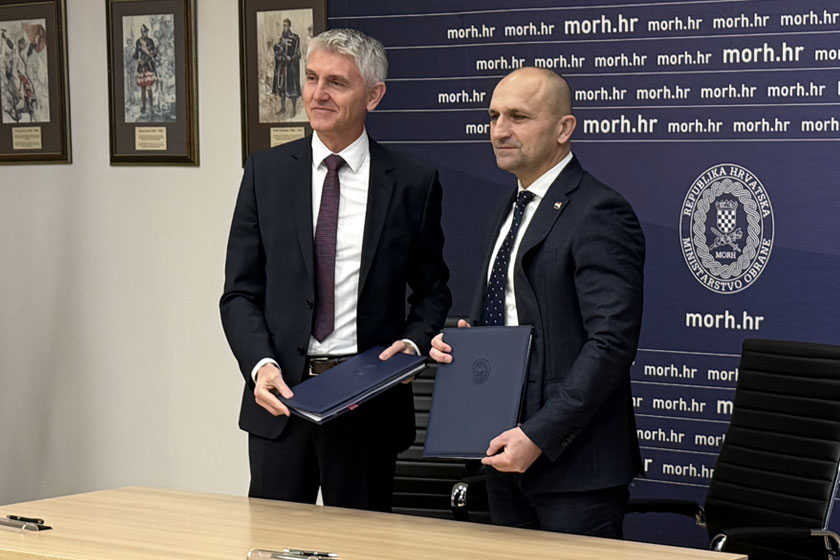Modernizing mobility: A new era in rail travel
Milestone agreement signed for electro-diesel multiple units (EDMUs) connecting Split and Zagreb
Today, on 23 July 2024, a landmark agreement was signed for the acquisition of 6 state-of-the-art electro-diesel multiple units (EDMUs), set to enhance connectivity between Split and Zagreb. Valued at EUR 57.3 million, this ambitious project is financed through a loan from the European Investment Bank (EIB). The loan agreement, part of the "Revitalization of the Railway System of the Republic of Croatia" initiative, was finalized in February 2024. This extensive project encompasses the acquisition of new trains, the construction of the Technical and Logistics Center in Zagreb, and a broad renovation and enhancement of local and regional railways, stations, and stops. These efforts are set to transform Croatia’s rail infrastructure, leading to improved efficiency and a superior passenger experience.
The contract was officially signed by Željko Ukić, Chairman of the Board of HŽ Passenger Transport, and Josip Ninić, Chairman of the Board of KONČAR – Electric Vehicles. The ceremony was attended by distinguished guests including Prime Minister Andrej Plenković, Deputy Prime Minister and Minister of the Sea, Transport, and Infrastructure Oleg Butković, Deputy Prime Minister and Minister of Physical Planning, Construction, and State Assets Branko Bačić, Minister of Tourism and Sports Tonči Glavina, Split-Dalmatia County Prefect Blaženko Boban, and Gordan Kolak, KONČAR CEO.
These state-of-the-art trains will revolutionize travel between Split and Zagreb, with increased daily departures ensuring seamless local and regional connections. This will greatly enhance mobility and convenience for all citizens.

“The new trains will replace the tilting trains that have been operating between Split and Zagreb since 2004. In two years, the first of these new trains will be on the tracks, with one additional train entering service each month thereafter. By the end of 2026, we will have a completely renewed fleet serving these two cities. The introduction of these 6 new trains will enable more frequent daily departures between Split and Zagreb. Effective rail connectivity is a significant opportunity to increase passenger numbers, offering the most environmentally friendly, energy-efficient, and affordable means of transportation. We are thrilled that these new trains will significantly enhance connectivity and raise the quality of our service to unprecedented levels," emphasized Željko Ukić, President of the Management Board of HŽ Passenger Transport.
The railway line connecting Zagreb and Split spans 429 km, with electrification from Zagreb to Oštarije, and non-electrified tracks from Oštarije to Split. During the journey, the trains will utilize both electric and diesel power, leveraging the high power of the traction motors to meet the demands of the challenging mountainous terrain. These trains will reach a maximum speed of 160 km/h and will have the capability to functionally couple multiple trains, thereby ensuring increased capacity.
“With the delivery of these new vehicles, KONČAR is at the forefront of creating innovative solutions that reduce climate impact, provide long-term sustainability, and embrace forward-looking digitalization. Our relentless pursuit of mobility technology advancements supports one of the European Union's key goals – the establishment of green and sustainable transportation. Our trains stand as some of the leading high-tech products in Croatian industry, and it is especially noteworthy that their development involves numerous Croatian companies, including those in Dalmatia. As we move forward, it is imperative that our country fosters an environment that encourages and facilitates investment in development, enabling our national economy to build the credentials needed to excel on the international stage," stated Gordan Kolak, KONČAR CEO.
Deputy Prime Minister and Minister Oleg Butković highlighted that, in addition to the procurement of new trains, substantial investments are underway to modernize the railway infrastructure. EU funds are financing the renovation and construction of main corridor railways, while loans from the European Investment Bank are being utilized to upgrade local and regional lines.
“Currently, we have 61 new trains in service, with 33 of these acquired and launched within the past few years. By the end of next year, we will have a total of 70 new trains, which will make up more than half of our entire fleet. Furthermore, a significant change has been made to the transportation map, especially for the Dalmatia region, which has been included in the network of European transport corridors for the first time. This opportunity paves the way for EU co-financing to modernize the Lika railway. We have already commenced the installation of signalling and safety devices, along with remote control systems, on the Oštarije to Knin section. Furthermore, the National Recovery and Resilience Plan (NPOO) will provide funding to extend these installations from Knin to Split, facilitating quicker travel on this route," stated Deputy Prime Minister and Minister of the Sea, Transport, and Infrastructure Oleg Butković.
As the second-largest city in Croatia and a key tourist gateway linking many coastal and island destinations, Split's enhanced rail connection with Zagreb presents a substantial opportunity to increase passenger traffic. Acquiring these new trains will boost the energy efficiency of our transportation network and contribute to lower noise levels and reduced greenhouse gas emissions from traffic.
“I am truly excited about today’s contract between HŽPP and KONČAR, as it signifies a new era for rail travel on the Zagreb–Split route with the addition of 6 new trains. However, as the minister rightly pointed out, it is essential to prioritize the renewal of infrastructure so these trains can run on suitable tracks from Zagreb to Split. We are optimistic that everything will be fully operational by 2027," stated Blaženko Boban, Prefect of Split-Dalmatia County.
This project furthers the modernization of HŽ Passenger Transport's fleet, providing a more efficient and competitive railway passenger service while also greatly enhancing the sustainability of Croatia's transportation system.
Technical specifications of the electro-diesel multiple units
The electro-diesel multiple units will feature a low-floor design and three doors on each side for easy boarding and disembarking. They will be equipped with wheelchair ramps, dedicated bicycle storage, and restrooms, including one that is wheelchair accessible. The passenger area will be monitored by a comprehensive video surveillance system. Monitors will display video content throughout the train. Passenger comfort and connectivity are enhanced by visual and audio station announcements, along with free WiFi access throughout the train. The trains will also include a cutting-edge passenger information system, power outlets, and self-service vending machines for food and beverages.
Train capacity: 150 seats (12 in first class, 138 in second class)



